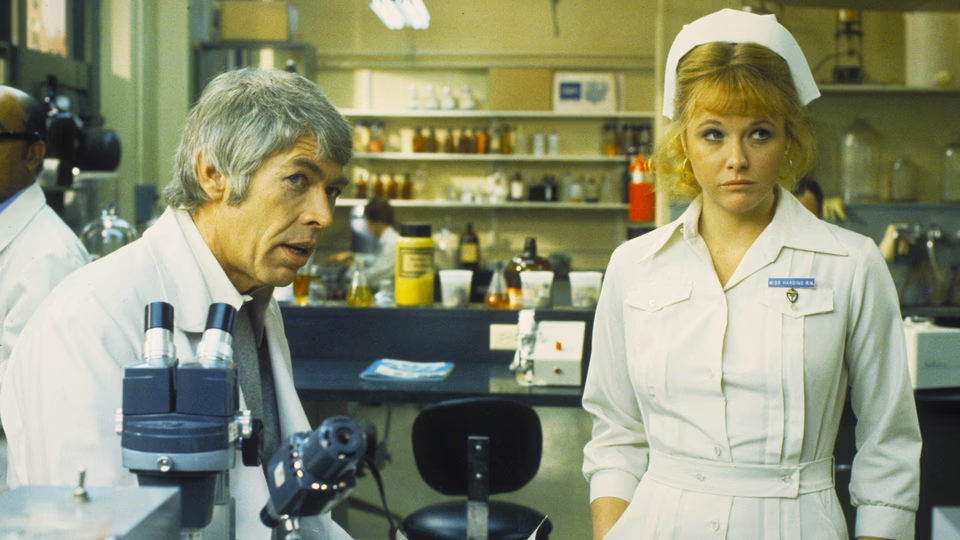The Carey Treatment

James Coburn plays Dr. Peter Carey, a pathologist who arrives in Boston for a job at a hospital. When the hospital chief’s fifteen-year-old daughter dies from a botched abortion, Carey’s old friend Dr. Tao, a skilled Chinese-American surgeon, stands accused of murder. Frustrated by the police’s unwillingness to look past the hearsay evidence, Carey investigates himself.
Coburn would have made a great Philip Marlowe. His character has all the traits: tough, inquisitive, insubordinate, and incorruptible. He’s even from California. He’s not Marlowe, of course, but the script proffers some worthy dialog. Consider this exchange between Carey and the police captain Pearson, played by Pat Hingle:
Carey: And that’s all you need?
Pearson: That’s all. But if there’s more we’ll find it. Now Who knows, you might even be involved.
Carey: Oh, yeah, well, there’s always that possibility.
Pearson: Does that mean you are?
Carey: It means that, uh, that is a possibility.
Pearson: Why do you take a tough line, doctor?
Carey: Well, you can always bring out the rubber hose.
Pearson: Ah, no, we don’t do it that way anymore.
Carey: Oh, gee, I wish I could be more reassured about that.
Pearson: Uh, it’s better you aren’t.
Carey: Oh, you mean that in my case you just might make an exception?
Pearson: Anything is possible.
That could read out of a 30s or 40s pulp noir. But it also includes some modern quips, like after Carey sasses the hospital chief over the intercom and a coworker advises not to antagonize the boss. “Well, listen,” says Carey rising, “Before I kiss his ass, I think I’ll go have a look at it.” Good stuff.
The inciting incident also reminds us we’re dealing with a modern picture. We see the young girl pull up to her palatial home, then collapse into the steering wheel. Next she’s on a gurney being wheeled out of an ambulance, her crotch and upper thighs soaked and smeared with blood. A rough scene, but effective at upping the emotional stakes.
Besides abortion, the script introduces a host of other hot-button social issues. Consider how Dr. Tao describes the hospital chief to Carey:
With J.D., if you’re under 60 and white, you call him “Sir.” If you’re black, yellow or somewhere in between you evaporate.
And how a coworker justifies stonewalling Carey’s investigation:
A daughter of J.D. Randall was killed by an abortion. Now, someone has to pay. Tao’s an abortionist, and in Boston with a jury more than half Catholic, they’ll convict him on general principles.
Said coworker is also performing a biopsy for morphine on a blood sample from his son. Drug addiction also figures into the story, with the hospital discovering missing morphine and suspecting an inside job.
The trouble is, the film leaves most of these threads unresolved, rendering the mystery’s resolution unsatisfying. Carey uncovers reams of corruption, but it proves unrelated to the case he’s investigating.
Take the scene between Carey and the hospital chief’s new young wife. She tries to charm him early, but Carey’s having none of it.
Carey: Tell me about your daughter.
Mrs. Randall: My step daughter. I’m not old enough to have been her mother.
Carey: Oh, really?
Mrs. Randall: Yeah, really.
Carey: Oh, well, if you say so.
Mrs. Randall: Alright, doctor, get to the point.
Their dialog crackles, closing with this exchange.
Mrs. Randall: I don’t swipe lipsticks from the five and dime anymore. I sit in a family pew. I belong to the flower society. And I very seldom say shit in company.
Carey: Well, let’s hear it for Mrs. Randall.
Mrs. Randall: I’m a member of the club with all dues paid.
Carey: Can’t lay a glove on you?
Mrs. Randall: I don’t think so.
Carey: I’m gonna try.
Mrs. Randall: Be my guest.
A terrific scene, but she doesn’t figure into the mystery aside from having lied to the police. No hidden motive aside from a rush to a false conclusion.
Instead, the story sees Carey’s pathological skills aid him in discovering a key clue, then it devolves into a contrived finale set in the hospital where Carey extracts a confession from the real abortionist then survives an encounter with a scalpel-wielding killer. Neither of whom proves connected to any of the racism or corruption Carey’s uncovered, instead tying back to the hospital’s attempt to find out who’s stealing morphine.
Jennifer O’Neill’s character proves another casualty of this forced plotting. She charms from the outset, endearing herself to us and showing us what Carey sees in her from her first scenes. But then she disappears. You could cut her out of the film with no impact to the story. Granted, I prefer her disappearing than being forced into a third-act damsel-in-distress role, but a better script would have done more with her character.
Still, the first two acts shine. Coburn tools around in his wood-paneled station wagon, pushes his nose into powerful people’s business, and intimidates confessions out of their snobbish teenage daughters. The more people tell him to stop, the deeper he digs. Vintage Marlowe.